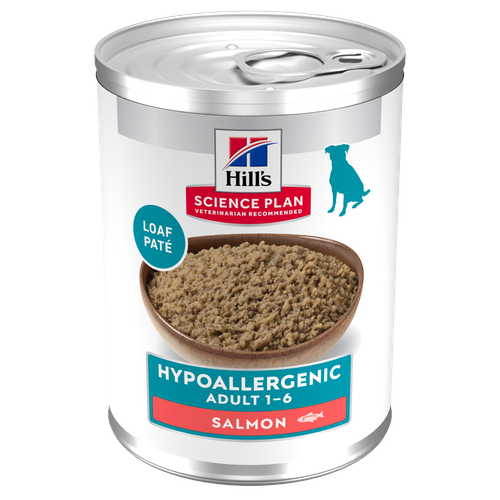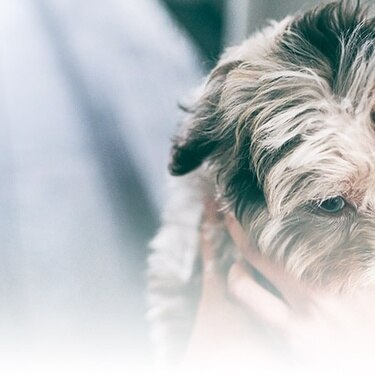
-
Find the right food for your petTake this quiz to see which food may be the best for your furry friend.Find the right food for your petTake this quiz to see which food may be the best for your furry friend.Featured products
 Adult Wet Dog Food with Beef
Adult Wet Dog Food with BeefHill's Science Plan Adult Multipack Wet Dog Food with Chicken, Beef & Turkey are complete premium pet foods for adult dogs from 1 year. Your dog will love these deliciously smooth and savoury minced loaves, formulated for balanced nutrition and overall health.
Shop Now Puppy Food
Puppy FoodHill's Science Plan Puppy Multipack Wet Dog Food with Chicken & Beef are complete premium pet foods for growing puppies from weaning until 1 year old and for pregnant and nursing dogs. Your puppy will love these deliciously smooth and savoury minced loaves, formulated for balanced nutrition and overall health.
Shop Now Mature Adult Dog Food
Mature Adult Dog FoodHill's Science Plan Mature Adult Multipack Wet Dog Food with Chicken & Beef are complete premium pet foods for mature adult dogs from 7 years. Your dog will love these deliciously smooth and savoury minced loaves, formulated to deliver the appropriate amount of energy to support the needs of adult dogs.
Shop NowFeatured products Adult Multipack Wet Cat Food with Beef, Ocean Fish & Chicken
Adult Multipack Wet Cat Food with Beef, Ocean Fish & ChickenTender chunks in gravy for cats, with high-quality protein to maintain lean muscle. With vitamin E and omega-3s & -6s for healthy skin and balanced minerals to support healthy vital organs.
Shop Now Light Adult Multipack Wet Cat Food with Chicken & Ocean Fish
Light Adult Multipack Wet Cat Food with Chicken & Ocean FishTender chicken chunks in gravy for cats, with L-carnitine and fewer calories for ideal weight management. Packed with high-quality protein, omega-6s, and vitamin E for shiny fur and healthy skin.
Shop Now Mature Adult Wet Cat Food with Chicken
Mature Adult Wet Cat Food with Chicken
Tender chicken chunks in gravy for mature adult cats. Made with easy-to-digest ingredients, high-quality protein for lean muscle maintenance and antioxidant vitamins C+E for optimal health.
Shop Now -
Dog
- Dog Tips & Articles
-
Health Category
- Weight
- Food & Environmental Sensitivities
- Urinary
- Digestive
- Joint
- Kidney
-
Life Stage
- Puppy Nutrition
- Adult Nutrition
- Senior Nutrition
Cat- Cat Tips & Articles
-
Health Category
- Weight
- Skin & Food Sensitivities
- Urinary
- Digestive
- Kidney
-
Life Stage
- Kitten Nutrition
- Adult Nutrition
Featured articles Show some love with wet foods: a great choice for pets with health issues
Show some love with wet foods: a great choice for pets with health issuesShow some love with wet foods: a great choice for pets with health issues.
Read More The Incredible Science Behind Your Pet's Microbiome
The Incredible Science Behind Your Pet's MicrobiomeLearn what your pet's microbiome is, how it contributes to your pet's gut and overall health, and why nutrition is important in maintaining healthy microbiomes.
Read More The Right Diet For Your Pet
The Right Diet For Your PetIn people, the right diet is very important. If you are eating the wrong way for your metabolism, activity level, age and lifestyle you could end up with health issues.
Read More -


Most people these days worry about weight gain more than loss, but if your dog is suddenly losing weight for no apparent reason, it can be a cause for concern. You may not notice weight loss until it’s pretty significant, especially if your dog has long or thick fur. Weighing your dog monthly throughout their life is a great habit to get into so you can spot trends in either direction quickly.
Body weight is a simple balance of calories in versus calories out, so if your dog loses weight, something has gone wrong with this balance. It could be that they are taking in fewer calories, the body is suddenly burning more calories, or the nutrients from food are not getting where they need to be. The reasons for this can be very varied. Let’s look at some of the common causes of sudden weight loss in dogs that’s unexplained or unexpected.
Causes of reduced calorie intake
- Lack of appetite, also called anorexia, may be due to many things. Your dog may become less interested in food because they feel unwell or nauseous due to illness such as liver or kidney disease or stress and anxiety, such as a new baby or big changes in the home.
- Pain. If your dog is in pain, they may be depressed or simply not want to move to actually go and eat. This may be particularly true if they have mouth or dental pain or pain in their neck.


Tasty Tips
Causes of increased calories burned
Increased exercise. This may sound silly, but if you suddenly have more time to walk your dog, they’ve met a new friend to play with, or someone else is walking your dog more, then they may simply be exercising more and need more food. Talk to your vet about whether the food they are on is adequate.
Pregnancy and lactation take lots of energy. If your dog is pregnant or feeding puppies, she will need ad lib puppy food to keep her energy balance right.
Certain diseases, such as cancer and diabetes, may result in your dog eating normally or even more than usual but still losing weight.
Nutrients not getting where they are needed
- Almost any gastrointestinal disease can cause weight loss. The food your dog eats may pass through the gut too quickly to be properly absorbed, such as in cases of diarrhoea. A deficiency in certain enzymes may mean they can’t digest fat or one particular component of their food, leading to malnutrition and weight loss.
- Parasites, such as worms living in the intestines, can ‘steal’ a significant amount of your dog’s food. Always make sure your preventative healthcare is up to date and suitable for your dog’s lifestyle.
Should you be concerned?
Unless you’ve made a conscious effort to get some weight off your dog, any unexplained weight loss should be investigated. Try to be an observant owner. Has your dog’s appetite increased or decreased? Are they drinking more than usual? Have you noticed any diarrhoea or changes in colour or frequency of their stools? Could they be pregnant? Has something drastic happened at home, like a new arrival?
The more information you can give your vet, the better. They will almost certainly want to do blood and urine tests as well as the normal physical exam. If you can take a stool sample, that will help too.
As we said at the beginning, weight loss may be a very early sign of disease, so regular weight checks are essential for spotting things as soon as possible so you can get help. As always, if you are ever concerned or unsure, talk to your vet. It’s always better to be safe than sorry.
Reviewed by Dr. Hein Meyer, DVM, PhD, Dipl-ECVIM-CA


One of our staff authors prepared this article for you
Related products

Hill's Science Plan Adult Multipack Wet Dog Food with Chicken, Beef & Turkey are complete premium pet foods for adult dogs from 1 year. Your dog will love these deliciously smooth and savoury minced loaves, formulated for balanced nutrition and overall health.

Hill's Science Plan Mature Adult Multipack Wet Dog Food with Chicken & Beef are complete premium pet foods for mature adult dogs from 7 years. Your dog will love these deliciously smooth and savoury minced loaves, formulated to deliver the appropriate amount of energy to support the needs of adult dogs.

Hill's Science Plan Puppy Multipack Wet Dog Food with Chicken & Beef are complete premium pet foods for growing puppies from weaning until 1 year old and for pregnant and nursing dogs. Your puppy will love these deliciously smooth and savoury minced loaves, formulated for balanced nutrition and overall health.

Hill's Science Plan Hypoallergenic Adult Wet Dog Food with Salmon is a complete premium pet food for all adult dogs from 1 year. This savoury tinned loaf is specially formulated for dogs with delicate skin and stomachs. It features a single novel animal protein source and is grain-free.
Related articles

Learn effective tips for feeding a dog that's a picky eater and ensure proper nutrition for a finicky eater. Discover tips for pet parents at Hill's Pet UK.

How, when and what to feed your new puppy is an important decision, learn more about the things to consider for feeding your puppy.

Learn about the potential health risks of a raw diet for dogs and why they aren't the best option for your pup or you.

Many human foods are dangerous to dogs. Read about 5 of the worst toxic food offenders that can kill your dog - and how much it takes to hurt them.

Put your dog on a diet without them knowing
Our low calorie formula helps you control your dog's weight. It's packed with high-quality protein for building lean muscles, and made with purposeful ingredients for a flavourful, nutritious meal. Clinically proven antioxidants, Vitamin C+E, help promote a healthy immune system.
Put your dog on a diet without them knowing
Our low calorie formula helps you control your dog's weight. It's packed with high-quality protein for building lean muscles, and made with purposeful ingredients for a flavourful, nutritious meal. Clinically proven antioxidants, Vitamin C+E, help promote a healthy immune system.

